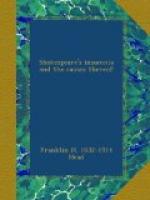When we seek to analyze what we mean by the term Shakespeare, to endeavor to define wherein he was distinct from all others and easily pre-eminent, to know why to us he ever grows wiser as we grow wise, we find that his especial characteristic was an unequalled power of observation and an ability accurately to chronicle his impressions. He was the only man ever born who lived and wrote absolutely without bias or prejudice. Emerson says of him that “he reported all things with impartiality; that he tells the great greatly, the small subordinately,—he is strong as Nature is strong, who lifts the land into mountain slopes without effort, and by the same rule as she floats a bubble in the air, and likes as well to do the one as the other.” Says he, further: “Give a man of talents a story to tell, and his partiality will presently appear: he has certain opinions which he disposes other things to bring into prominence; he crams this part and starves the other part, consulting not the fitness of the thing but his fitness and strength.” But Shakespeare has no peculiarity; all is duly given.
Thus it is that his dramas are the book of human life. He was an accurate observer of Nature: he notes the markings of the violet and the daisy; the haunts of the honeysuckle, the mistletoe, and the woodbine. He marks the fealty of the marigold to its god the sun, and even touches the freaks of fashion, condemning in some woman of his time an usage, long obsolete, in accordance with which she adorned her head with “the golden tresses of the dead.” But it was as an observer and a delineator of man in all his moods that he was the bright, consummate flower of humanity. His experiences were wide and varied. He had absorbed into himself and made his own the pith and wisdom of his day. As the fittest survives, each age embodies in itself all worthy of preservation in the ages gone before. In Shakespeare’s pages we find a reflection, perfect and absolute, of the age of Elizabeth, and therefore of all not transient in the foregone times,—of all which is fixed and permanent in our own. He “held the mirror up to Nature.” So “his eternal summer shall not fade,” because
“He sang of the earth as it will
be
When the years have passed away.”
If, therefore, insomnia had prevailed in or before his time, in his pages shall we find it duly set forth. If he had suffered, if the “fringed curtains of his eyes were all the night undrawn,” we shall find his dreary experiences—his hours of pathetic misery, his nights of desolation—voiced by the tongues of his men and women.
Shakespeare speaks often of the time in life when men have left behind them the dreamless sleep of youth. Friar Laurence says:—
“Care keeps his watch in every old
man’s eye,
And where care lodges, sleep can never
lie;
But where unbruised youth with unstuffed
brain
Doth couch his limbs, there golden sleep
doth reign.”




